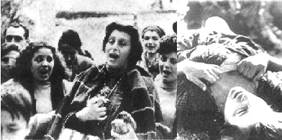![[Your Constitutional Rights!]](images/header.jpg)
![[Your Constitutional Rights!]](images/header.jpg)
"The state has no legitimate interest in protecting religions from views distasteful to them."

| "beautiful, artistic." "sacrilegious." |
New York, 1950. Film critics call "The Miracle": "beautiful," "artistic," "courageous." New York's State Board of Regents calls it "sacrilegious," and bans it. State law makes it illegal to show any film the Board finds "indecent, immoral, sacrilegious or that tends to corrupt morals." The film's distributor, Joeseph Burstyn, appeals.
In 1952, a unanimous Supreme Court declares the state law
unconstitutional.![[Justice Clark]](images/justice/clark.jpg) "From the standpoint of freedom of speech and the press,"
writes Justice Clark, "the state has no legitimate interest in protecting any or all
religions from views distasteful to them. It is not the business of our government to
suppress real or imagined attacks upon a particular religious doctrine, whether they
appear in publications, speeches, or motion pictures."
"From the standpoint of freedom of speech and the press,"
writes Justice Clark, "the state has no legitimate interest in protecting any or all
religions from views distasteful to them. It is not the business of our government to
suppress real or imagined attacks upon a particular religious doctrine, whether they
appear in publications, speeches, or motion pictures."
For more...
Italian Films by Roberto Rossellini
"Il Miracolo" (Part 2 of "L'Amore" trilogy) Internet Movie Database
|
AMENDMENT 1 Freedom of Religion, Speech, and Assembly
Passed by Congress September 25, 1789. Ratified December 15, 1791.
![[Amendment #]](images/amend/I.jpg) Congress shall make no law respecting an
establishment of religion, or prohibiting the free exercise thereof; or abridging the
freedom of speech, or of the press; or the right of the people peaceably to assemble, and
to petition the Government for a redress of grievances. [^].
Congress shall make no law respecting an
establishment of religion, or prohibiting the free exercise thereof; or abridging the
freedom of speech, or of the press; or the right of the people peaceably to assemble, and
to petition the Government for a redress of grievances. [^].
Your
Constitutional Rights. A WEB & RADIO project of:
ACLU
Montana | HearingVoices.